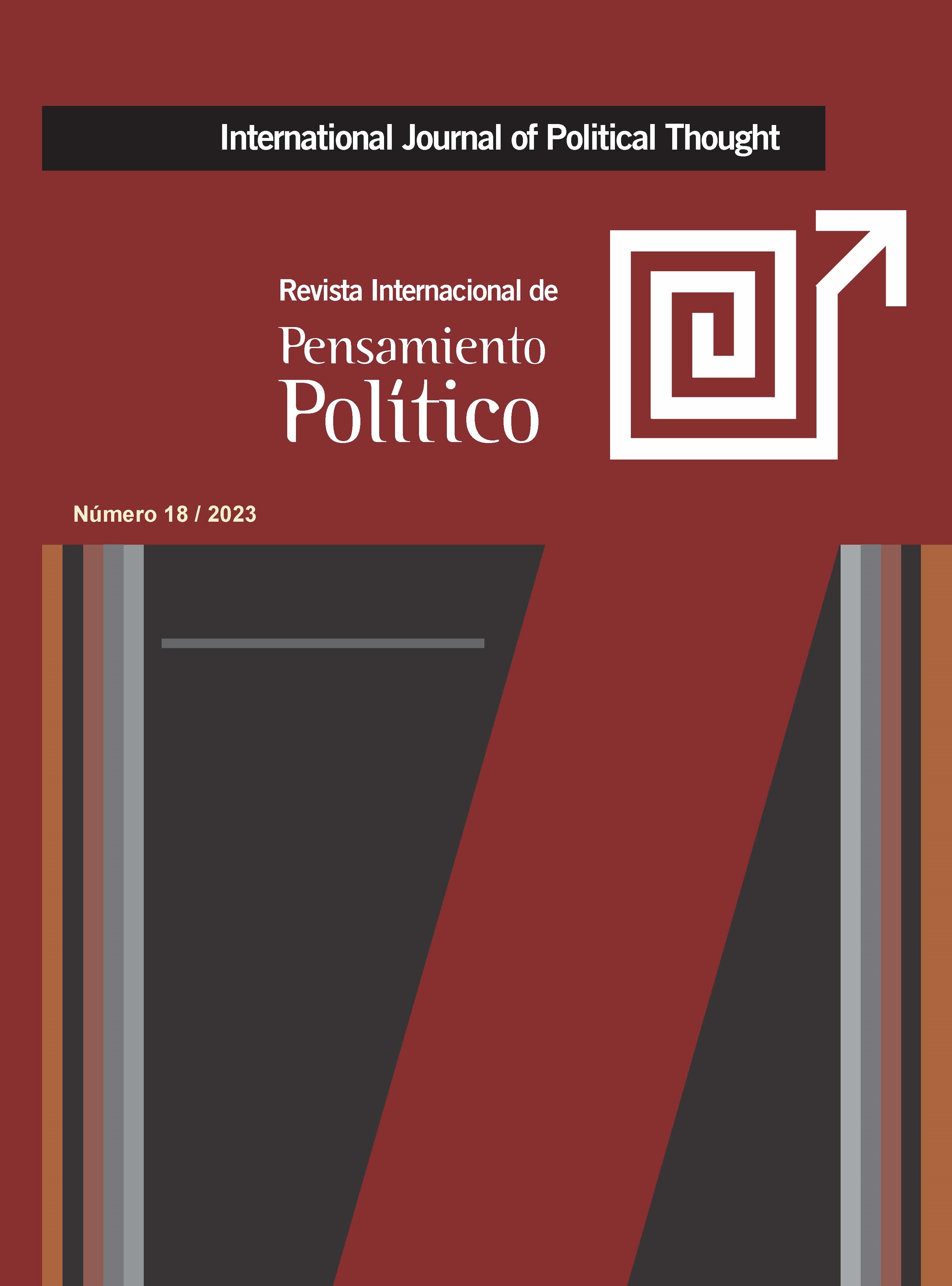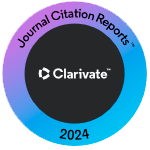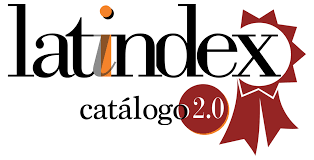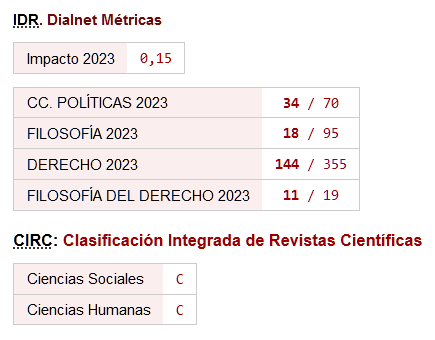La construcción teórica de la corrupción
¿Tenemos claro de qué hablamos?
DOI:
https://doi.org/10.46661/revintpensampolit.8822Palabras clave:
rankings internacionales, positivismo, aproximaciones metodológicas, definición, corrupciónResumen
Uno de los grandes inconvenientes que distorsiona cualquier investigación sobre corrupción estriba en definir el objeto material de estudio. La corrupción, al ser un fenómeno multiforme y, de alguna manera, onmipresente en todas las coordenadas culturales, precisa abordajes pluridisciplinares, de forma que el descriptivismo y el positivismo sean transcendidos. El estudio de la corrupción, su conceptualización teórica y las metodologías de aproximación han estado en manos de organizaciones que han monopolizado su diseño, su creación y, sobretodo, su significado. Las tradicionales visiones no sirven para entender qué es la corrupción, por lo que es preciso revisar las principales tendencias para poner de manifiesto sus luces y sombras, es decir, el grado de alcance explicativo de las líneas epistemológicas y metodológicas comúnmente utilizadas.
Descargas
Citas
AGUILAR JUNCOSA, I. M. (2021). "Los riesgos de corrupción de los lobbies", Revista Española de Transparencia, 12, p. 126. https://doi.org/10.51915/ret.122 DOI: https://doi.org/10.51915/ret.122
BAKOWSKI, P. (2022). “Combating Corruption in The European Unión”, Think Tank European Parliament (European Parlamentary Research Service, December)
BODRUZIC, D. (2016). "Vice or Coping Mechanism? Bridging Political Science and Anthropological aproches to the Study of Corruption", Critique of Anthropology, 4, 36 p. 376. https://doi.org/10.1177/0308275X16654552 DOI: https://doi.org/10.1177/0308275X16654552
BUCHAN, B. (2002). "Changing Contours of Corruption in Western Political Thought, c. 1200-1700", en BARCHAM, M; HINDESS, B.; LARMOUR, P. (eds). Corruption. Expanding the Focus, ANU Press, p.73.
CAIDEN, G. (2001). "Corruption and Governance", en CAIDEN, G. et al. (eds). Where Corruption Lives. Bloomfield: Kumarian Press, p. 21. DOI: https://doi.org/10.1515/9781565495975
DE GRAAF, G. (2007). "Causes of Corruption: Towards a contextual Theory of Corruption", Public Administration Quarterly, 31, 1/2, pp. 39-86.
DE GRAAF, G., WAGENAAR, P., HOERDERBOOM, M. (2009). "Constructing Corruption", en DE GRAAF, G. et al (eds). The Good Cause. Theoretical Perspectives on Corruption, Verlag Barbara Budrich, p. 109. https://doi.org/10.3224/86649263 DOI: https://doi.org/10.3224/86649263
DE LA TORRE, M. (2016). "The Foreign Corrupt Practice Act: Imposing an American Definition of Corruption in Global Markets", Cornell International Law Journal, 49, 2, p. 762.
FIJNAUT, C. & HUBERT, L. (2002). Corruption, Integrity and Law Enforcement. The Hague: Kluwer Law International, p.4.. https://doi.org/10.1163/9789004481213 DOI: https://doi.org/10.1163/9789004481213
GARZÓN, B. (2015). El fango: cuarenta años de corrupción en España. Barcelona: Debate.
HARRISON, E. (2007): "Corruption", Development in Practice, 17, 4/5, p. 674. https://doi.org/10.1080/09614520701469971 DOI: https://doi.org/10.1080/09614520701469971
HELLER, P. (2009). "Understanding corruption: How systems theory can help ", en DE GRAAF, G. et al (eds), opus cit., pp. 65-66.
HEYWOOD, A. (1997): "Political Corruption: Problems and Perspectives", Political Studies, XLV, p. 426. https://doi.org/10.1111/1467-9248.00089 DOI: https://doi.org/10.1111/1467-9248.00089
HINDESS, B. (2013). "Good Goverment and Corruption", en LARMOUR, P & WOLANIN, N.: Corruption and Anti-corruption, ANU Press, p. 4. https://doi.org/10.22459/CAC.03.2013.01 DOI: https://doi.org/10.22459/CAC.03.2013.01
JAIN, A.K. (2001). "Corruption: A Review", Journal of Economic Surveys, 15, 1, pp. 86-87. https://doi.org/10.1111/1467-6419.00133 DOI: https://doi.org/10.1111/1467-6419.00133
KENNEDY, D. (1999). "The International Anti‐Corruption Campaign", Connecticut Journal of International Law, 14, pp. 455-465.
KOBYLKA, J. F. & KENT CARTER, B. (1987). "Madison, 'The Federalist', & the Constitutional Order: Human Nature & Institutional Structure", Polity, 20, 2, pp. 190-208. https://doi.org/10.2307/3234779 DOI: https://doi.org/10.2307/3234779
KROEZE, R. at al. (2018). "Introduction. Debating corruption and anticorruption in History", en KROEZE, R.; VITÓRIA, A; GELTNER, G. (eds): Anticorruption in History. From Antiquiety to Modern Era, Oxford University Press, p. 1. https://doi.org/10.1093/oso/9780198809975.003.0001 DOI: https://doi.org/10.1093/oso/9780198809975.003.0001
LEDERMAN, D., LOAYZA, N. V., SOARES, R. (2005). "Accountability and corruption: political institutions matter", Economics & Politics, 17, 1, pp. 1-2. https://doi.org/10.1111/j.1468-0343.2005.00145.x DOI: https://doi.org/10.1111/j.1468-0343.2005.00145.x
LEYS, C. (1965): "So What Is Really the Problem about Corruption?", The Journal of Modern African Studies, 3, 2, p. 215. https://doi.org/10.1017/S0022278X00023636 DOI: https://doi.org/10.1017/S0022278X00023636
MCGOVERN, F. (1907): "Legal repression of political corruption". Proceedings of the American Political Science Association, 4, p. 206. https://doi.org/10.2307/3038473 DOI: https://doi.org/10.2307/3038473
MCKRITICK, E. L. (1957): "The Study of Corruption", Political Science Quaterly 72, 4, p. 502. https://doi.org/10.2307/2146191 DOI: https://doi.org/10.2307/2146191
MEDINA, J. (2015). "When Rhetoric Obscures Reality: The Definition of Corruption and its Shortcomings", Loyola of Los Angeles Law Review, 48, pp. 546-650.
MORA MOLINA, J.J. (2014). "Corrupción y rendición de cuentas", Derechos y Libertades, 30, 145-172.
MORA MOLINA, J.J. (2017). "Cuando legislar no es suficiente: las consecuencias prácticas de los artículos 6 y 68 de la Constitución española", Derechos y Libertades, 37, 103-129.
MOROFF, H. (2005). "Internationalisierung von Anti‐Korruptionsregimen", en Alemann, Ul‐rich v. (ed.): Dimensionen politischer Korruption. Beiträge zum Stand der internationalen Forschung. Wiesbaden: VS Verlag für Sozialwissenschaften, pp. 444-477. https://doi.org/10.1007/978-3-322-80518-8_24 DOI: https://doi.org/10.1007/978-3-322-80518-8_24
NYE, J. (1967). "Corruption and Political Development: A Cost-Benefit Analysis", The American Political Science Review, 61, 2, p. 419. https://doi.org/10.2307/1953254 DOI: https://doi.org/10.2307/1953254
PARK, H. (2003). "Determinants of Corruption: A Cross-National Analysis", The Multinational Business Review, 11, 2, pp. 29-30. https://doi.org/10.1108/1525383X200300010 DOI: https://doi.org/10.1108/1525383X200300010
PROSHUNIN, M.M. & KUMUKOV, M.SH. (2020). "Legal and Theoretical Approaches to the Definition of Corruption", RUDN Journal of Law. 24, 3, p. 450. https://doi.org/10.22363/2313-2337-2020-24-3-497-512 DOI: https://doi.org/10.22363/2313-2337-2020-24-3-497-512
REVUELTA, A; VILLORIA, M. (2016). "La regulación de los grupos de interés como instrumento de prevención de la corrupción", en VILLORIA, M; GIMENO FELIU, J.M.; TEJEDOR BIELSA, J. (Dir): La corrupción en España. Ámbitos, causas y remedios jurídicos, Barcelona, Atelier. https://doi.org/10.4000/ccec.5949 DOI: https://doi.org/10.4000/ccec.5949
ROSE-ACKERMAN, S. (1996). "Corruption and Democracy", Proceedings of the Annual Meeting (American Society of International Law), MARCH 27-30, Vol. 90: Are International Institutions Doing their Job?, p. 83. https://doi.org/10.1017/S0272503700085827 DOI: https://doi.org/10.1017/S0272503700085827
SCHULLER, W. (1982). Korruption im Altertum, München: R. Oldenbourg, p. 125. https://doi.org/10.1515/9783486823103 DOI: https://doi.org/10.1515/9783486823103
TANZI, V. (1995). "Corruption: Arm's-lengh Relationships and Markets", en FIORENTINI, G. & PELZMAN SM (eds.): The Economics of Organised Crime, Cambridge University Press. https://doi.org/10.1017/CBO9780511751882.014 DOI: https://doi.org/10.1017/CBO9780511751882.014
TEORELL, J. (2007). "Corruption as Instituion. Rethinking the Nature and Origins of the Grabbing Hand", QoG Working Papers Series 5.
THEOBALD, R. (1999): "So What Really Is the Problem About Corruption?", Third World Quaterly, 20, 3, pp. 491-502. https://doi.org/10.1080/01436599913640 DOI: https://doi.org/10.1080/01436599913640
United Nations Office on Drugs and Crimes, 2004. UNITED NATIONS CONVENTION AGAINST CORRUPTION. New York, (unodc.org)
VILLORIA MENDIETA, M. (2019). "Introducción: ¿de qué hablamos cuando hablamos de corrupción?", en Combatir la corrupción, Madrid, Gedisa, pp. 15-32.
WARREN, M.E. (2004): "What Does Corruption Mean in Democracy?", American Journal of Political Science, 48, 2, pp. 229-30. https://doi.org/10.2307/1519886 DOI: https://doi.org/10.2307/1519886
WARRENT, M. E. (2006): "Democracy and Deceit: Regulating Appearances of Corruption", American Journal of Political Science 50, 1, p. 161. https://doi.org/10.1111/j.1540-5907.2006.00176.x DOI: https://doi.org/10.1111/j.1540-5907.2006.00176.x
WILLIAMS, R. (1999): "New Concepts for Old?", Third World Quaterly, 20, 3, p. 503. https://doi.org/10.1080/01436599913659 DOI: https://doi.org/10.1080/01436599913659
Descargas
Publicado
Cómo citar
Número
Sección
Licencia
Derechos de autor 2023 Juan Jesús Mora

Esta obra está bajo una licencia internacional Creative Commons Atribución-NoComercial-CompartirIgual 4.0.
Política de acceso abierto
Se permite el acceso libre y abierto de cualquier interesado a todos los contenidos de los números de la revista, sin costo alguno, pudiendo imprimir y trasladar todos los artículos, con la única condición de precisar la fuente y la autoría.
La revista: a) no cobra a las autorías costes por el procesamiento de los artículos ni por el envío de los mismos, b) mantiene el copyright para los autores sin restricciones, c) facilita a los autores conservar sus derechos de publicación sin limitaciones.
La Revista Internacional de Pensamiento Político es una obra original del Laboratorio de Ideas y Prácticas Políticas de la Universidad Pablo de Olavide. Todos los artículos incluidos en la Revista son obra original de sus respectivas autorías. Esta Revista se ofrece libremente a la comunidad científica y académica sin coste alguno y libera los contenidos de acuerdo a la licencia "Reconocimiento-NoComercial-CompartirIgual 4.0 CC BY-NC-SA" del proyecto Creative Commons dispuesta en la siguiente url: https://creativecommons.org/licenses/by-nc-sa/4.0/legalcode
Si deseas traducir o compilar alguno de los artículos aquí disponibles, por favor, ponte en contacto













